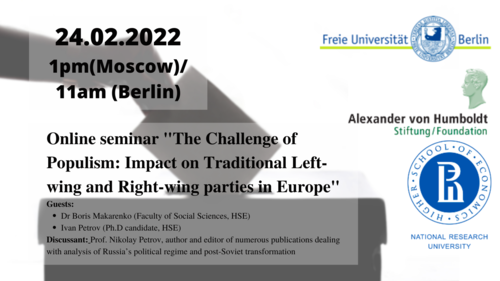Online seminar "The Challenge of Populism: Impact on Traditional Left-wing and Right-wing parties in Europe"
The institutional partnership project between the Institute for East European Studies of the Free University Berlin (FUB) and HSE University supported by the Alexander von Humboldt Foundation (AvH) is inviting you to attend the series of online seminars "Varieties of populism in East and West". The theme of the fourth workshop will be "The Challenge of Populism: Impact on Traditional Left-wing and Right-wing parties in Europe".
News from Jan 05, 2022
Populism is commonly believed to be a “thin ideology”: However, its rise in the recent decades produced a profound impact on the established party systems in Europe (as well as the United States).
Not only the populism itself may take different positions on the left-right axis (or take a “valence” position not belonging to any particular place on that axis), but it appeals – sometimes asymmetrically – to voters of traditional parties.
We aspire to track the trends and tendencies of evolution of European party systems under the pressure of populism in since 1990s.
The speakers present:
- Dr Boris Makarenko (Faculty of Social Sciences, HSE): “The Conventional Left Surrounded by Populism”.
The reasons for decline of electoral support of social democratic parties are multiple. However, one of the main factors is that their voters defect from them to support populists. Paradoxically, this drift takes different directions. Right-wing populists attract such voters with their accent on Euroskepticism and anti-migrant sentiments; left-wing populist are more vocal and radical about disparity and poverty, even “valence” - neither left, nor right like Italian “5 Star Movement”. Why is it happening? What are the scenarios? What to expect in the future?
- Ivan Petrov (Ph.D candidate, HSE).
Key findings of the analysis of databases of MARPOR (positioning of parties on left-right scale based on its electoral platforms) and CHES (expert assessment of party positions by means of standard statistical methods, including correlation and cluster analysis:
• According to the initial hypothesis, in the countries of Western Europe, there really was a transformation of the concepts of left and right within the framework of stretching the spectrum along the socio-cultural axis. At the same time, the socio-economic problems have also not lost their relevance, and after the 2008 crisis it has become more acute.
• On the whole, in Western Europe, this period was characterized by a smooth convergence of the positions of party families, as well as a polarization of the party field, which intensified after 2008.
• The new parties that have emerged in this period are oriented along the socio-cultural axis, with the exception of those that replace the old parties. At the same time, the socio-cultural axis is still actively represented only at one end - cultural protectionism.
• Despite the latter, the appeal to socio-cultural issues has become an important trump card in the spatial struggle for the voter. Due to the latter, in many European countries, where previously there was a system of two party centers, its disintegration in favor of third parties is observed.
- Discussant: Prof. Nikolay Petrov, the author and editor of numerous publications dealing with analysis of Russia’s political regime, post-Soviet transformation, socioeconomic and political development of Russia’s regions, democratization, federalism, and elections, among other topics.
Language: English
Date: 24th of January, 2022
Time: 13:00 Moscow Time Zone
Online Platform: Zoom
We count with ca. 1.3 hours workshop duration.
More information about the seminar series of FUB-HSE "Varieties of populism in East and West" here and here.
We would be happy to welcome all of you, as well as any other colleagues who might be interested in the topic.
The main goal of the seminars' series is to maintain a platform for communication of persons doing research in similar fields and to support any kind of collaborations on the individual and institutional levels.
If you have any questions, please contact Salavat Abylkalikov (sabylkalikov@hse.ru).
